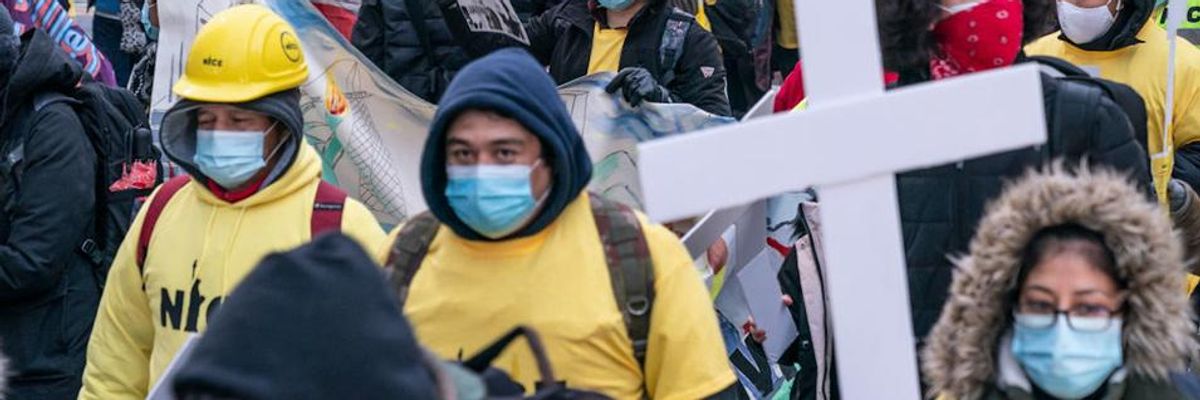Immigrant and worker rights advocates welcomed this week's passage of a New York state budget package containing a provision authorizing payments of up to $15,600 to undocumented migrants who have been adversely affected by the coronavirus pandemic.
"I've met neighbors who have not been able to pay rent, or put food on the table, or been able to provide their children with a laptop when a public school has not been able to provide one."
--New York state Sen. Jessica Ramos
The New York Times reports the $2.1 billion Excluded Worker Fund, part of New York's $212 billion budget deal reached on Tuesday, provides for one-time payments to people who lost their jobs during the pandemic and can prove they reside in the state and are ineligible for unemployment benefits due to their immigration status.
According to The Guardian, the move could benefit as many as 300,000 Empire State residents, with about 92,000 workers believed to be eligible for the full $15,600 payment.
Immigrants have been hit disproportionately hard by both Covid-19 and its economic consequences. Overall joblessness quadrupled (pdf) in New York state between March and August 2020, with sectors in which many migrants work--including leisure and recreation, and accommodation and food service--suffering 46% and 40% decreases in employment, respectively.
Startling snapshots of migrant unemployment include a 90% joblessness rate among people served by the Bronx-based community education group Masa, the loss of all 1,500 to 2,000 jobs in Nepali-speaking nail salons served by the nonprofit advocacy group Adhikaar, and 76% of Chinese Progressive Association clients put out of work, according to the Center for an Urban Future.
An April 2020 study (pdf) by James A. Parrott and Lina Moe of the New School's Center for New York City Affairs estimated that 192,000 of the city's undocumented workers have lost their jobs due to the pandemic.
Housing and food insecurity often follow the loss of income. An August 2020 study by Lauryn Quick and Colleen Heflin of the Lerner Center for Public Health Promotion at Syracuse University found that from late April through mid-July, nearly one in five households in New York state and 22% in the New York City metropolitan area reported not being able to afford last month's housing payment.
In New York City, multiple organizations told the Center for an Urban Future that up to 75% of their clients were going hungry.
"Virtually the entire population we serve is jobless and facing food insecurity."
--Annetta Seecharran,
Chhaya CDC
"Virtually the entire population we serve is jobless and facing food insecurity," said Annetta Seecharran, executive director of Queens-based South Asian and Indo-Caribbean advocacy group Chhaya CDC.
Democratic New York state Sen. Jessica Ramos, the lead proponent of the Excluded Worker Fund, told the Times, "I've met neighbors who have not been able to pay rent, or put food on the table, or been able to provide their children with a laptop when a public school has not been able to provide one."
Amid such hardship, migrants and their advocates hailed the creation of the fund.
"There have been 23 days without food. Twenty-three days when I was hungry and in pain," Ana Ramirez, an undocumented worker and a member of the New York Communities for Change advocacy group, told AMNY Wednesday. "But it hasn't just been 23 days. It's actually been decades of pain, the pain of indifference and negligence. Today, our work today has been recognized. Our dignity has been recognized, and our dignity has been lifted by passing this fund."



